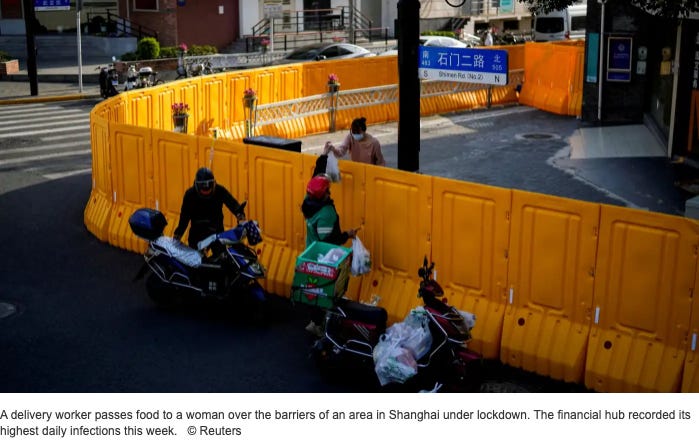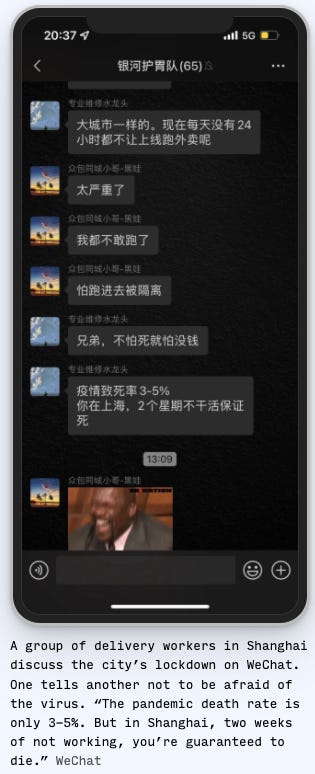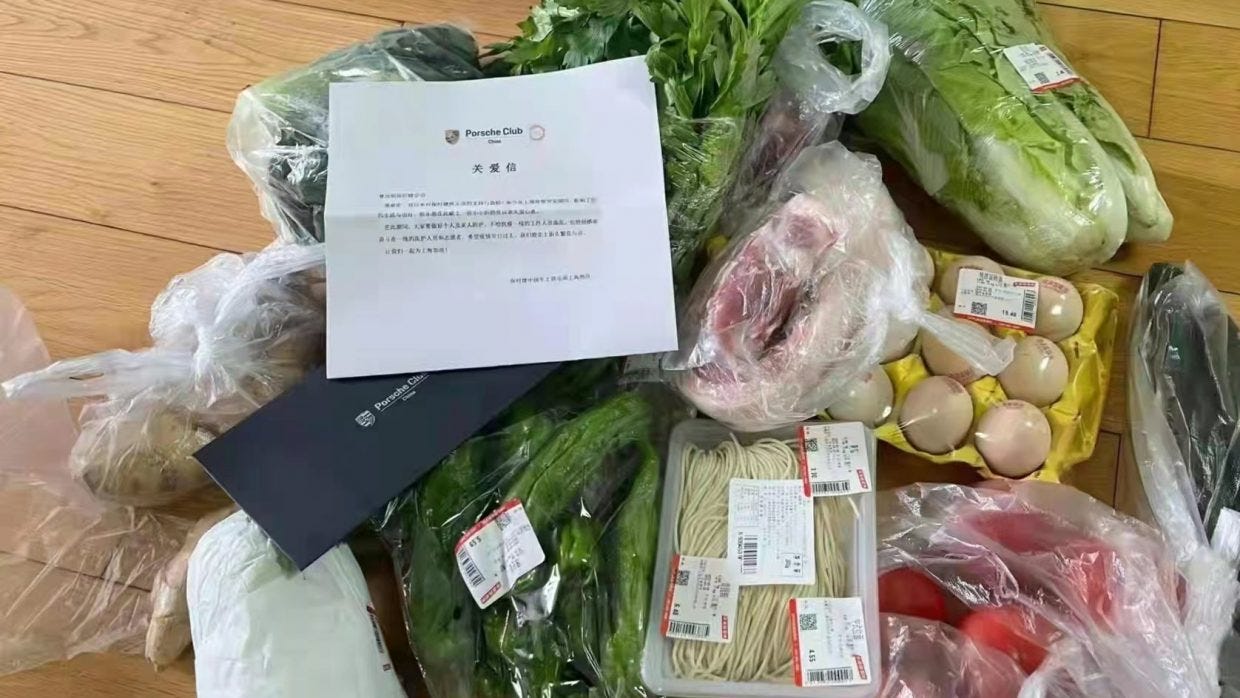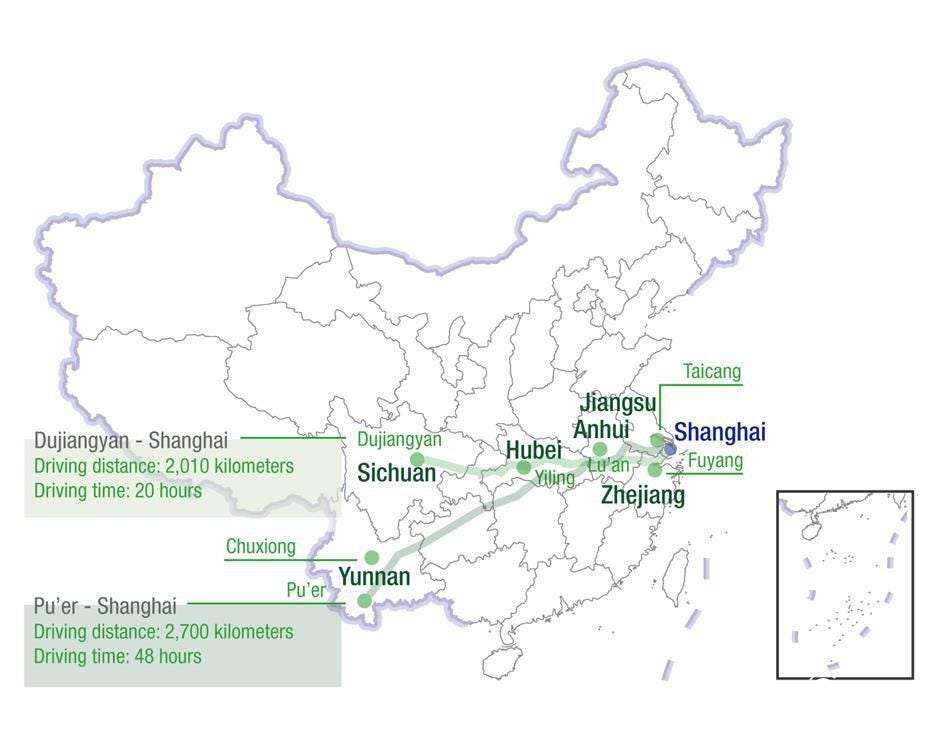Shanghai under lockdown: What it’s like for the food industry
Shanghai and some 26 million people are in lockdown these days. If you are not based in Shanghai, you missed the chaos as people grabbed the last potatoes, cabbage or eggs, and some rice.
Of course, you might have experienced this elsewhere in the world at some point but for Shanghai, where the number of cases is above 50,000 as I write, it’s new.
There is a difference though.
China is following a strict “zero-COVID” policy, which means that everything has stopped for a few days (or weeks?) to contain the spread before it reaches less-equipped provinces in the rest of the country. So China pulled the emergency brake on Shanghai.
All restaurants, shops, malls, and markets are closed, as of at least April 1 and until an undetermined future date. A handful of stores offering “essential” products are open, but getting a delivery person is another story.
So this week, I show the impact of this shutdown on Shanghai.
— Greg
PS : This is not complete. There are many examples and a lot to talk about. Let’s discuss it in the comment section; I will follow-up in a future newsletter.
Hi, I’m Greg, founder of NextStep [F&B] Studio. We help F&B brands and companies grow by implementing new F&B trends & innovations inspired by what’s happening in China and Asia in general.
The Asia FoodTech Confidential Newsletter is my way to share what’s happening in the Food and Beverage industry with F&B professionals, FMCG experts, Tech entrepreneurs, and Investors with a focus on China and Greater Asia. Contact greg@nextstepstudio.co.
TODAY’S SPECIALS
1 - Be prepared - you know when it will hit the fan
2 - Make sure you can deliver to your customer until you can’t
3 - Logistics and supplies are key
4 - Show residents you care.
5 - The famous Sun Tzu saying: “You scratch my back, I scratch yours”
Let’s dig in!
1 - Restaurants had to prepare before the lockdown
Before the lockdown started for the Puxi half of the city on April 1, there were several city-wide lockdowns of major cities in other areas, including Shenzhen and Changchun. In the last days before the lockdown, it was full spring outside but a cold winter was coming.
Operations of many restaurants became like a Tetris game, as warehouses locked down, fresh food became in high demand and prices rose for raw materials. Even if you were able to open, your staff may have been locked down. Shifting to delivery-only, as the government-mandated in most districts, put you at the mercy of the few delivery drivers still available to work. For some restaurants, the solution was selling ingredients straight to the public, to clear the fridges and reduce stock.
This is going to come at a high cost for the country, the city, but also of course to most of the business owners (both F&B owners, but also suppliers and distributors) if they do not receive compensation. Those without a tight handle on their cash flow will suffer the most.
“Lost business at retailers, hotels, and restaurants could directly cost Shanghai 3.7 per cent of its annual Gross Domestic Product (GDP)[…]. The Chinese government has set a target for the country's GDP to grow by 5.5 per cent this year. But some analysts have said it will struggle to meet that goal.” (source: Ahmedabamirror)
2 - Food Delivery put under pressure - How to maintain the supply chain?
Lockdown in China means going without our friends at Eleme (饿了么) or Meituan (美团外卖). All the shops are closed on the platforms except a few with special authorizations given by areas but where supplies are extremely limited.
Rest of World reports: “The harsh restrictions imposed on major cities as part of the government’s zero-Covid policy do not affect all workers equally. While white-collar employees at big tech companies have largely been able to work from home during the lockdowns, blue-collar workers, whose income is tied to their jobs in the streets and on production lines, have faced difficult decisions.“
Before the Shanghai lockdown, many employees who could not go back to their apartments without facing a couple of weeks of quarantine due to a positive case in the neighborhood often had to sleep in the street in order to keep on working. To be fair, Meituan and Eleme started organizing hotels for some delivery people, but most of them didn’t manage to get a spot.
And indeed, now that the whole city is under lockdown, all restaurants closed on April 1st until further notice, and many workers have had no choice but to return home.
3 - Food hoarding - Logistics is everything
When the Shanghailockdown was announced, people on the west side of Shanghai (Puxi) had three to four days to gather food while people on the east side (Pudong) had only a few hours to get prepared, and things got really out of control with the predictable hoarding rush, fights, and price surges…
“Vegetable wholesalers in Shanghai told Sixth Tone the reason for the difficulty of buying groceries is not lack of supply, but logistics.” To solve the problem, many companies are using the “shared employee” strategy to hire employees from partner companies, including restaurants.
And here is the Shanghai Lockdown rap video that went viral, composed and performed by CATI2, P.J, and Keyso: “Get Fed or Get Tested!” edited and translated by Sixth Tone.
4 - Did you get your government cucumbers yet?
Care packages were distributed in the first few days of the lockdown for Puxi, but this came a bit late for people who were already in lockdown for weeks in certain parts of the city, where cases were identified early. Packages were different from one district to another but people received a mix of frozen meats ( chicken, shrimp, sausage), and some fresh veggies (cabbage, potatoes, radish).
But actually, several luxury brands such as Porsche Club have been sending food baskets including simple things such as apples and celery, to Porsche owners to show support, and so did Louis Vuitton, Cartier, Gucci and Bvlgari.
5 - Provinces bring support to Shanghai - Make friends early
Thanks to strong alliances, fresh meat, fruits, and vegetables from all corners of China arrived in Shanghai to supplement local supplies, as demand peaked just before the onset of the April 1 lockdown.
Talk to me about these stories and what it means for your business!
The FoodTech Confidential Newsletter is supported in part by:
Stcavish + Co is an F&B market intelligence company, specializing in firsthand research and other data-driven information about restaurants, hotels, and more in China.
For information about our services, please contact stcavish@stcavish.com or see us on LinkedIn.
That’s it for now
As you can imagine, while doing my research, I am finding a lot more things that didn’t make the cut here (and some are going straight to LinkedIn). Let me know if you’d like to know more and drop me a comment, just reply to this email directly or contact greg@nextstepstudio.co.










